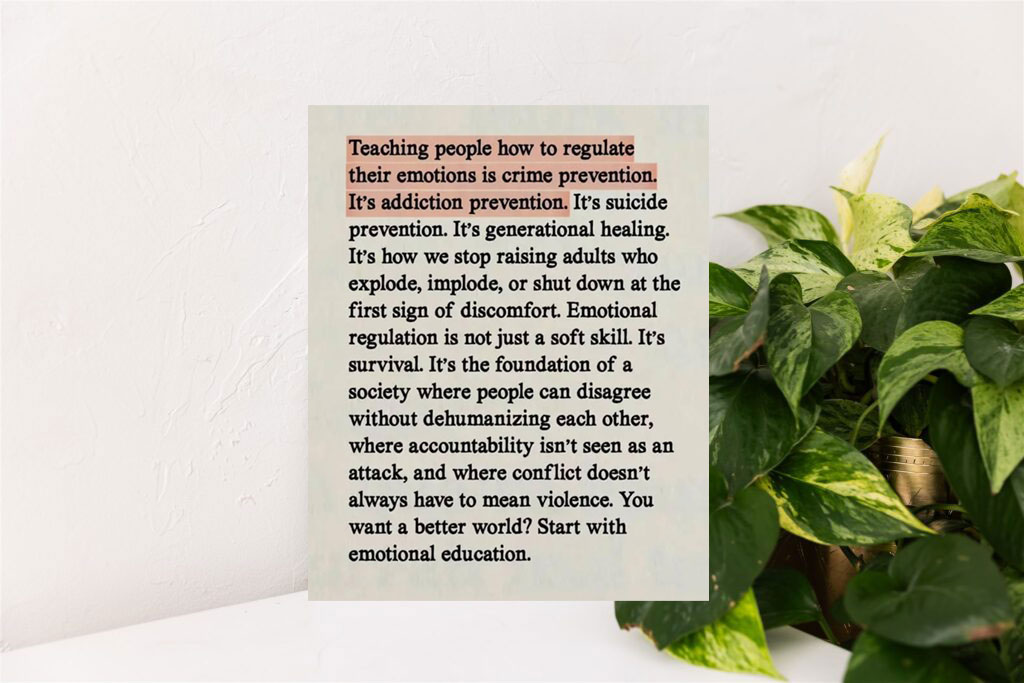At Forest Path Psychiatry, we often witness the profound ripple effects that occur when someone learns to navigate their emotional landscape with skill and compassion. What might appear to be individual healing work actually represents something much larger—a fundamental building block for healthier communities, families, and future generations.
Beyond Individual Wellness: The Societal Impact
When we teach someone to regulate their emotions, we're doing far more than helping them feel better in the moment. We're engaging in what could be called preventive medicine on a societal scale. Consider the far-reaching implications:
Crime Prevention: Research consistently shows that individuals with strong emotional regulation skills are significantly less likely to engage in impulsive, harmful behaviors. When someone can pause between feeling and acting, when they can sit with discomfort without immediately seeking to discharge it through aggression or other destructive means, they're less likely to harm others or themselves.
Addiction Prevention: Emotional dysregulation is one of the strongest predictors of substance use disorders. When people lack healthy coping mechanisms for intense emotions, they often turn to external substances or behaviors for relief. Teaching emotional regulation provides alternative pathways for managing pain, anxiety, and overwhelming feelings.
Suicide Prevention: The ability to tolerate distress and maintain perspective during emotional storms can literally be life-saving. Emotional regulation skills help individuals recognize that intense feelings are temporary and that there are ways to navigate through crisis moments safely.
Breaking Generational Patterns
Perhaps most importantly, emotional regulation represents generational healing in action. When adults learn to manage their emotions skillfully, they stop unconsciously passing trauma responses down to their children. They model healthy conflict resolution, demonstrate how to disagree without attacking, and show that accountability doesn't have to feel like assault.
Children who grow up witnessing regulated adults learn that:
- Emotions are information, not emergencies
- Conflict can lead to connection rather than destruction
- It's possible to feel intensely without acting destructively
- Relationships can weather disagreement and remain intact
More Than a "Soft Skill"
In our fast-paced, achievement-oriented culture, emotional regulation is sometimes dismissed as a "soft skill"—nice to have but not essential. This perspective misses the profound truth: emotional regulation is survival. It's the difference between reacting and responding, between perpetuating cycles of hurt and creating new patterns of healing.
When we frame emotional regulation as survival, we recognize its true importance. Just as we wouldn't send someone into the wilderness without teaching them to find water or build shelter, we shouldn't send people into the complexities of human relationships without teaching them to navigate their inner emotional terrain.
Creating Space for Healthy Disagreement
One of the most beautiful outcomes of widespread emotional regulation is the possibility of a society where people can disagree without dehumanizing each other. When individuals can manage their own emotional reactivity, they create space for nuanced conversations, for holding multiple perspectives simultaneously, and for finding common ground even amid significant differences.
This isn't about suppressing emotions or avoiding conflict—it's about engaging more skillfully. It's the difference between a heated argument that leaves relationships damaged and a passionate discussion that deepens understanding.
The Path Forward
At Forest Path Psychiatry, we've seen countless individuals transform not just their own lives but the lives of everyone around them by developing emotional regulation skills. The work often begins with understanding that emotions, while sometimes overwhelming, are temporary visitors rather than permanent residents.
Key elements of emotional regulation include:
Mindful awareness: Noticing emotions as they arise without immediately reacting
Distress tolerance: Learning to sit with uncomfortable feelings without needing to escape them immediately
Emotional literacy: Developing a vocabulary for internal experiences that goes beyond "good" or "bad"
Self-compassion: Treating yourself with kindness during difficult emotional moments
Interpersonal effectiveness: Communicating emotions and needs in ways that strengthen rather than strain relationships
Starting Where You Are
If you're reading this and recognizing areas where emotional regulation could strengthen your life or relationships, know that it's never too late to start. Whether you're a parent wanting to break generational patterns, a professional seeking to handle workplace stress more effectively, or someone who simply wants to feel more at peace in your own skin, these skills can be learned.
The journey of emotional regulation isn't about becoming perfectly calm or never feeling intense emotions. It's about developing the capacity to feel deeply while choosing wisely how to respond. It's about becoming someone who can weather storms—both internal and external—with grace and wisdom.
A Vision for Tomorrow
Imagine communities where emotional regulation is as commonly taught as reading and math. Where children grow up learning that feelings are valid but not all responses are helpful. Where adults model curiosity about difficult emotions rather than fear or avoidance. Where conflicts become opportunities for deeper understanding rather than reasons for permanent division.
This isn't utopian thinking—it's practical prevention. Every person who learns to regulate their emotions becomes a point of light in their community, creating ripples of healing that extend far beyond what they might ever realize.
At Forest Path Psychiatry, we're honored to be part of this larger movement toward emotional wellness. If you're ready to explore how emotional regulation might transform your life and relationships, we're here to support you on that journey.
If you're interested in learning more about emotional regulation or would like to explore therapy options, please don't hesitate to reach out to Forest Path Psychiatry. Together, we can work toward not just individual healing, but the kind of generational change that creates a more compassionate world for everyone.

